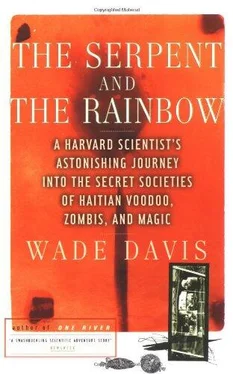Wade Davis - The Serpent and the Rainbow
Здесь есть возможность читать онлайн «Wade Davis - The Serpent and the Rainbow» весь текст электронной книги совершенно бесплатно (целиком полную версию без сокращений). В некоторых случаях можно слушать аудио, скачать через торрент в формате fb2 и присутствует краткое содержание. Год выпуска: 1985, Издательство: Simon & Schuster, Жанр: Старинная литература, на английском языке. Описание произведения, (предисловие) а так же отзывы посетителей доступны на портале библиотеки ЛибКат.
- Название:The Serpent and the Rainbow
- Автор:
- Издательство:Simon & Schuster
- Жанр:
- Год:1985
- ISBN:нет данных
- Рейтинг книги:5 / 5. Голосов: 1
-
Избранное:Добавить в избранное
- Отзывы:
-
Ваша оценка:
- 100
- 1
- 2
- 3
- 4
- 5
The Serpent and the Rainbow: краткое содержание, описание и аннотация
Предлагаем к чтению аннотацию, описание, краткое содержание или предисловие (зависит от того, что написал сам автор книги «The Serpent and the Rainbow»). Если вы не нашли необходимую информацию о книге — напишите в комментариях, мы постараемся отыскать её.
The Serpent and the Rainbow — читать онлайн бесплатно полную книгу (весь текст) целиком
Ниже представлен текст книги, разбитый по страницам. Система сохранения места последней прочитанной страницы, позволяет с удобством читать онлайн бесплатно книгу «The Serpent and the Rainbow», без необходимости каждый раз заново искать на чём Вы остановились. Поставьте закладку, и сможете в любой момент перейти на страницу, на которой закончили чтение.
Интервал:
Закладка:
I checked into the Hotel Ollofson, a filigree mansion draped in bougainvillea and saturated with the air of that long-forgotten era when the United States occupied Haiti. Leaving my bags at the desk, I left immediately for the home of Max Beauvoir, in Mariani, south of the capital beyond a frenetic thoroughfare known as the Carrefour Road. All the traffic that drains the hinterland to the south passes here, but it is less a route than a happening, a condensation in a few kilometers of all the life and drama of the city. My driver treated it as a free-for-all, flying recklessly past stevedores bent double beneath loads of ice and charcoal, fish and furniture. From every direction kaleidoscopic “tap taps,” the Haitian buses, overflowing with nattering passengers and their goods, careened on and off the roadway in search of still more cargo. In front of shops, bossy marchand ladies flaunted their wares, artisans carved shoes out of tires, or forged carriage parts from iron bars. And everywhere Dominican girls in tight-fitting rayon hung heavy in doorways lined with caladium. It is a dirty, lively, gaudy boulevard where the roadside houses climb atop one another vying for the attention of those passing by.
Just beyond a cemetery of whitewashed tombs, the road bursts into the open, and for the first time since entering the Carrefour one senses the sea at hand. About three kilometers beyond, where the nose of the mountain touches the water, my driver turned into a grove of trees.
A porter met me at the gate, and I followed him through a marvelous garden toward a small outbuilding on the edge of the property. There, among a dusty collection of amulets and African art, Max Beauvoir awaited me. He was immediately impressive—tall, debonaire in dress and manner, and handsome. Fluent in several languages, he questioned me at length about my previous work, my academic background, and my intentions in Haiti. In turn, I offered my initial hypothesis concerning the use of poisons in the creation of zombis.
“And should you find these zombis? Will you not laugh at their misery?”
“I can’t say. Maybe, just as I laugh at my own.”
He smiled. “Spoken like a Haitian. Yes, we do laugh at our misfortune, but we reserve that right for ourselves.” He hesitated, pulling deeply on a cigarette. “I am afraid you shall be looking for this poison for some time, Mr. Davis. It is not a poison that makes a zombi, it is the bokor.”
“The bokor?”
“The priest who serves with the left hand,” he said cryptically. “But that is a false distinction.” He paused. “In a way, we are all bokors, we houngan. The houngan must know evil to combat it, the bokor must embrace good in order to subvert it. It is all one. The bokor who knows the magic can make anyone a zombi—a Haitian living abroad, a foreigner. Likewise, I can treat a victim, should I choose. It is our force, and our greatest defense. But this talk is in vain. This is a land where things are not the way they seem.”
Beauvoir led me back to my car, exchanging pleasantries but offering neither comment nor information related to my assignment. Instead, having revealed to me that he was a vodoun priest, a houngan, he asked me to return that night to witness his vodoun ceremony. The land we stood on was his hounfour—his temple, a sanctuary, and shrine.
Max Beauvoir held a commercial vodoun ceremony every night. Anyone was invited, and there was a ten-dollar charge for tourists that supported his family and the thirty or more people who worked for him. I arrived around ten and was taken into the peristyle, the roofed court of the hounfour, and was led around a semicircle of tables to the one where Beauvoir sat at the head. A waiter brought me a drink. Beauvoir invited me to scan the assembly of visitors, an eclectic gathering that included some French sailors, several groups of Haitians, an anthropology professor from Milan who had visited earlier in the day, a pair of journalists, and a party of American missionaries. There was the sound of a rattle, and Beauvoir directed my attention to the rear of the temple.
A white-robed girl—one of the hounsis , or initiates in the temple—came out of the darkness into the peristyle, spun in two directions, then placed a candle on the ground and lit it. The mambo , or vodoun priestess, repeated her motion bearing a clay jar, then carefully traced a cabalistic design on the earth, using cornmeal taken from the jar. This, Beauvoir explained, was a vévé , the symbol of the loa , or spirit, being invoked. The mambo next presented a container of water to the cardinal points, then poured libations to the centerpost of the peristyle, the axis along which the spirits were to enter. Further libations were offered to each of the three drums and the entrance of the temple. Then, with a flourish, the mambo led the initiates into the peristyle and around the centerpost, the poteau mitan , in a counterclockwise direction until they knelt as one before the houngan. Bearing a rattle, or asson , Beauvoir led the prayer, an elaborate litany that invoked in hierarchical order the spirits of the vodoun pantheon. He recited in an ancient ritual language whose sounds evoked all the mysteries of an ancient tradition.
Then the drums started, first the penetrating staccato cry of the cata , the smallest, whipped by a pair of long thin sticks. The rolling rhythm of the second, the seconde , followed, and then came the sound of thunder rising, as if the belly of the earth were about to burst. This was the maman , largest of the three. Each drum had its own rhythm, its own pitch, yet there was a stunning unity to their sound that swept over the senses. The mambo’s voice sliced through the night, and against the rising chords of her invocation the drummers beat a continuous battery of sound, a resonance so powerful and directed it had the very palm trees above swaying in sympathy.
The initiates responded, swinging about the peristyle as one body linked by a single pulse. Each hounsis remained anonymous, focused inward and turned away from the audience toward the poteau mitan and the drums. Their dance was not a ritual of poised grace, of allegory; it was a frontal assault on the forces of nature. Physically, it was a dance of shoulders and arms, of feet flat on the ground repeating deceptively simple steps over and over. But it was also a dance of purpose and resolution, of solidity and permanence.
For forty minutes the dance went on, and then it happened. The maman broke—fled from the fixed rhythm of the other two drums, then rushed back with a highly syncopated, broken counterpoint. The effect was one of excruciating emptiness, a moment of hopeless vulnerability. An initiate froze. The drum pounded relentlessly, deep solid blows that seemed to strike directly to the woman’s spine. She cringed with each beat. Then, with one foot fixed to the earth like a root, she began to spin in a spasmodic pirouette, out of which she soon broke to hurtle about the peristyle, stumbling, falling, grasping, thrashing the air with her arms, momentarily regaining her center only to be driven on by the incessant beat. And upon this wave of sound, the spirit arrived. The woman’s violence ceased; slowly she lifted her face to the sky. She had been mounted by the divine horseman; she had become the spirit. The loa, the spirit that the ceremony had been invoking, had arrived.
Never in the course of my travels in the Amazon had I witnessed a phenomenon as raw or powerful as the spectacle of vodoun possession that followed. The initiate, a diminutive woman, tore about the peristyle, lifting large men off the ground to swing them about like children. She grabbed a glass and tore into it with her teeth, swallowing small bits and spitting the rest onto the ground. At one point the mambo brought her a live dove; this the hounsis sacrificed by breaking its wings, then tearing the neck apart with her teeth. Apparently the spirits could be greedy, for soon two other hounsis were possessed, and for an extraordinary thirty minutes the peristyle was utter pandemonium, with the mambo racing about, spraying rum and libations of water and clairin, directing the spirits with the rhythm of her asson. The drums beat ceaselessly. Then, as suddenly as the spirits had arrived, they left, and one by one the hounsis that had been possessed collapsed deep within themselves. As the others carried their exhausted bodies back into the temple, I glanced at Beauvoir, and then back across the tables of guests. Some began nervously to applaud, others looked confused and uncertain.
Читать дальшеИнтервал:
Закладка:
Похожие книги на «The Serpent and the Rainbow»
Представляем Вашему вниманию похожие книги на «The Serpent and the Rainbow» списком для выбора. Мы отобрали схожую по названию и смыслу литературу в надежде предоставить читателям больше вариантов отыскать новые, интересные, ещё непрочитанные произведения.
Обсуждение, отзывы о книге «The Serpent and the Rainbow» и просто собственные мнения читателей. Оставьте ваши комментарии, напишите, что Вы думаете о произведении, его смысле или главных героях. Укажите что конкретно понравилось, а что нет, и почему Вы так считаете.












